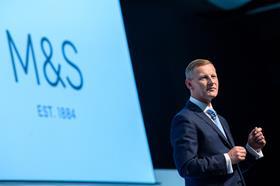
Marks & Spencer has suffered a sharp decline in profitability, but the retailer has insisted its transformation strategy will put it back on the path to success.
The upmarket clothing and food chain reported group revenue of £10.7 billion in the 52 weeks to 31 March 2018, a 0.7 per cent increase. However pre-tax profit plummeted by 62.1 per cent to just £66.8 million.
M&S said profitability was impacted by the decrease in food gross margin, but there was at least better news with food revenue growing 3.9 per cent on the back of store openings.
The Food business, however, is expected to end the year level in terms of space as new Simply Food stores are opened but less productive ones are closed. Some 62 new Simply Food stores were opened over the year, but like-for-like revenue fell 0.3 per cent.
The retailer has initiated a transformation programme after admitting it was struggling with the migration of clothing and home online, the development of global competition, the growth of home delivery in food and the rise of the discounters, all added to a challenging UK consumer market.
According to chief executive Steve Rowe, the first phase of the transformation is about restoring the basics and getting the 'architecture and infrastructure' fit for the future. That involves reducing costs by at least £350m, improving ways of working and reducing unnecessary waste.
Admitting M&S was a 'top-heavy business that was inward looking and too 'corporate',' Rowe said the Food and Clothing & Home businesses will now have their own leadership teams and support functions, with restructured marketing teams.
Attracting younger customers in food
The company has also struggled to attract younger family-age customers and larger households, he said, and there are plans underway to refresh the food offer with innovation, improved value for money, and a new focus on more popular family products. 'This will better exploit our unique credientials for freshness, taste and traceability,' he explained, adding that M&S will be slowing its new store opening programme while it reviews the format.
'The first phase of our transformation plan, restoring the basics, is now well underway and the actions taken have increased the velocity of change running through our business,' said Rowe. 'These changes come with short-term costs which are relected in today's results.
'There are a number of structural issues to address and we are taking steps towards fixing these. The new organisation will largely be in place by July and the team is now tackling transforming our culture to make M&S a faster, lower-cost, more commercial, more digital business. This is vital as we start to leverage the strength of the M&S brand and values across a family of businesses to deliver sustainable, profitable growth in three to five years.'



